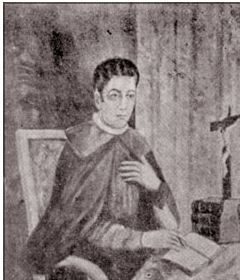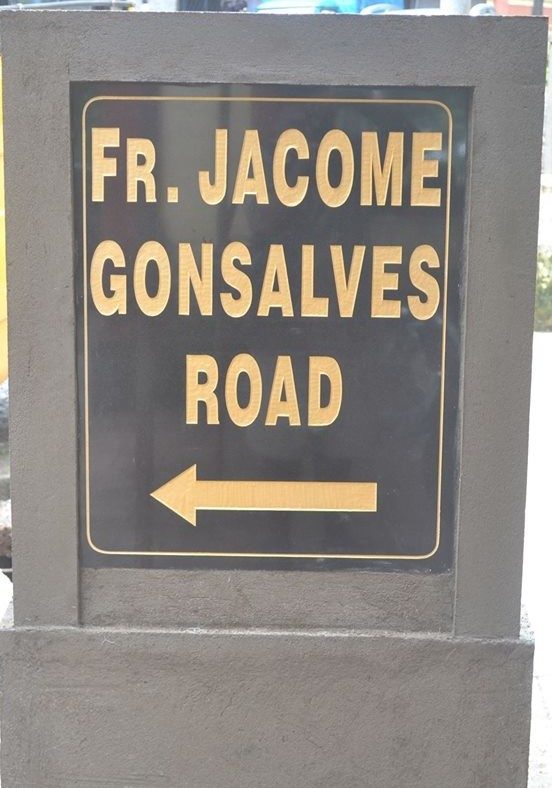To commemorate the death anniversary of Rev. Fr. Jacome Gonsalves on July 17, a religious service was held at Our Lady of Piety Church, Divar. The villagers also got together and named the main road passing through the island after Fr. Jacome Gonsalves, who was a son of the soil. The main village road facing his three and a half century old ancestral house is now called Fr. Jacome Gonsalves Road. His house which is now converted into the Divar High School will soon feel Fr. Jacome’s presence once again, as a statue of him is to be erected there.

While the people of Divar are basking in the celebrations; how many of us have actually heard of Fr. Jacome or know about him?
Early Life
Fr. Jacome Gonsalves was born on 8th June in 1676 on the Island of Chorao in Goa. He was the oldest son of Thomas Gonsalves and Mariana de Abreu. He lived with his family on the beautiful island of Divar. They had been Christians for around three generations, and were among the first converts at the beginning of Portuguese rule in Goa.
Fr. Jacome studied at the Jesuit College of Goa. He enrolled in the University of Goa, which is said to have been called Saint Paul’s College at that time, and obtained the degree of Bachelor of Arts. In 1696 he began theological studies at the Academy of St Thomas Aquinas in Goa, where he also held the post of organist. This led him to develop a taste for poetry, prose and music.
Soon after, he decided to enter the Oratorian Congregation of Goa. He was appointed to the chair of philosophy at the University of St Paul’s in Goa. He later relinquished the role just before he set off for Sri Lanka.
Life in Sri Lanka
It was St. Joseph Vaz who came to Sri Lanka in 1687 under the guise of a coolie who revived the Catholic faith. Blessed Joseph Vaz, as he was also called, introduced Oriental forms of worship, some prayers and Passion plays. However, he entrusted the main task of providing Catholic hymns, prayers and literature to his assistant, companion and successor, Fr. Jacome Gonsalves.
Fr. Jacome left his home in 1705 to join St. Joseph Vaz in Sri Lanka and never returned. He went there as a missionary to the Congregation of Oratory of the Holy Miraculous Cross. Fr. Jacome, like St Joseph Vaz, was a Konkani Brahmin by lineage. He left Goa on 9 May 1705 and reached Sri Lanka on 30 August 1705, arriving at Talaimannar. At the time, he knew Konkani, Portuguese, Latin and Spanish. During the long journey he studied Tamil. He improved his knowledge of the Language by reading Tamil classics. He also studied Sinhala under learned Buddhist Bhikkus (Bhuddist Monks or Devotees) and mastered it in no time.
“St Joseph Vaz planted the seed of Catholic faith in Sri Lanka and Fr Jacome Gonsalves watered and nourished it.”
Notable Work
Books
He is accredited with 22 books in Sinhala, 15 in Tamil, 4 in Portuguese and 1 in Dutch. Although he was a foreigner, rather than imitating the Christian works in the West, he produced original works to suit the cultural traits of this country. Sinhala and Tamil Catholics in Sri Lanka owe their Christian vocabulary to Fr. Jacome Gonsalves.
The most admired work of Fr. Jacome Gonsalves is “Deva Veda Puranaya”. “Deva Neethi Visarjanaya” which gives an account of the last judgement is said to have impressed even King Narendrasinghe of Kandy. “Suvisesha Visadyanaya” contains the Gospel for Sundays and feast days with commentary to be recited in the chanting style of Sinhala prose. In the past when there was no Sunday Mass in churches devotees used to chant the Gospel from it.
Passion plays
Blessed Joseph Vaz introduced Passion plays in Sri Lanka on the model of puppet shows he had witnessed in Goa. Fr. Jacome Gonsalves wrote “Dukprapthi Prasangaya” – a series of sermons to be chanted while the theatrical show was on. To break the tedium of listening to sermons he composed “Pasan” or lamentations to be recited in a plaintive tone. Even today Pasan introduced by Fr. Jacome Gonsalves are sung in churches and in homes during the season of Lent.
“Veda Kavya” is the best Sinhala poetry work of Fr. Jacome Gonsalves. This dealt with the creation of the world and the life of Christ. As Christian poets in the West have been influenced by Greek and Latin mythology in their work, Fr. Jacome Gonsalves denotes the influence of Hindu mythology and Sinhala Maha Kavyas. However in presentation, language and style he followed popular works like Guttialaya, Budugunalankaraya and Kusajathakaya. It is considered a splendid attempt at a synthesis between Christian themes and Sinhala poetic diction.
Fr Jacome left his footprints deep in the Lankan soil. He is called The Father of Catholic Literature in Sri Lanka and is also a key founder of the Catholic faith along with Blessed Joseph Vaz, in the country. The talented priest took over the position of Vicar General of Sri Lanka in 1717.
Fr Gonsalves died on 17 July 1742 in Bolawatte, Sri Lanka and was buried at the St. Mary’s Church there.


